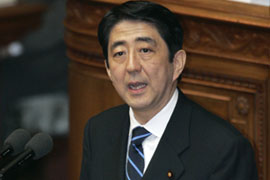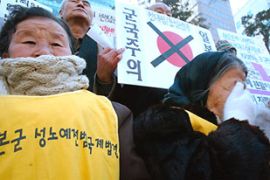Anger over Japan sex slavery denial
Japan PM’s denial of wartime sex slavery denounced by women’s rights groups.
|
“It is a fact that there was no evidence to support that there was coercion as it was defined at the time”
Shinzo Abe,
Japanese prime minister
|
Speaking to reporters in Tokyo late on Thursday, Abe said there had been “debate over the question of whether there was coercion.”
“It is a fact that there was no evidence to support that there was coercion as it was defined at the time,” he said.
“We must take into account there have been great changes in definitions.”
Abe’s remarks came in response to a recent US congressional resolution calling for Japan’s leader to “formally acknowledge, apologise and accept historical responsibility” for using thousands of Asian women as wartime sex slaves.
Representative Liza Maza, of the Philippine women’s party Gabriela, said Abe’s statement was “an affront to all women victims of Japanese military’s sexual slavery” during the war.
“My God. There are so many living survivors of such atrocity,” she told the Associated Press.
Apology downgrade
 |
Abe’s comments come amid growing debate
in Japan over its wartime past [Reuters] |
Abe’s remarks came as a group of 120 politicians from his ruling Liberal Democratic Party called on the government to downgrade a 1993 apology acknowledging that Japan’s wartime military was directly and indirectly involved in running brothels and forced women to work in them.
In recent years Japanese leaders have repeatedly apologised over the issue.
In 2001 Abe’s predecessor Junichiro Koizumi said he felt sincere remorse over the comfort women’s “immeasurable and painful experiences.”
Last month three women who say they endured rape and torture at the hands of Japanese soldiers testified in written statements to a subcommittee of the US House of Representatives.
Coerced
|
“As a living victim I would like to say that this was a coerced experience”
Lee Young-soo,
former “comfort woman”
|
Speaking to reporters in Tokyo on Friday, one of the women, 78-year-old Lee Young-soo, rejected suggestions that the women were prostitutes and were not forced to work in the brothels.
“The Japanese government is saying there was no coercion but as a living victim I would like to say that this was a coerced experience,” Lee, who was born in Korea, said.
The proposed US resolution does not seek Japanese reparations, but demands that Japan formally reject revisionists who say sexual enslavement never happened and that Japan educates children about the comfort women’s experiences.
Yoshimi Yoshiaki, a Japanese historian and author of the 1995 book “Comfort Women”, has estimated that up to 200,000 women from Korea, the Philippines, Taiwan, Indonesia and Burma served as sex slaves in about 2,000 military-run brothels across Asia during the war.
While Japan acknowledged in the 1990s that its military set up and ran brothels for its troops, it has rejected individual compensation claims, saying they were settled by post-war treaties.
Japanese courts have rejected a number of lawsuits brought by former sex slaves.
In 1995 the government created a private fund providing a way for Japan to compensate former sex slaves without offering official government compensation.
Many former comfort women have rejected the fund which expires this month.

